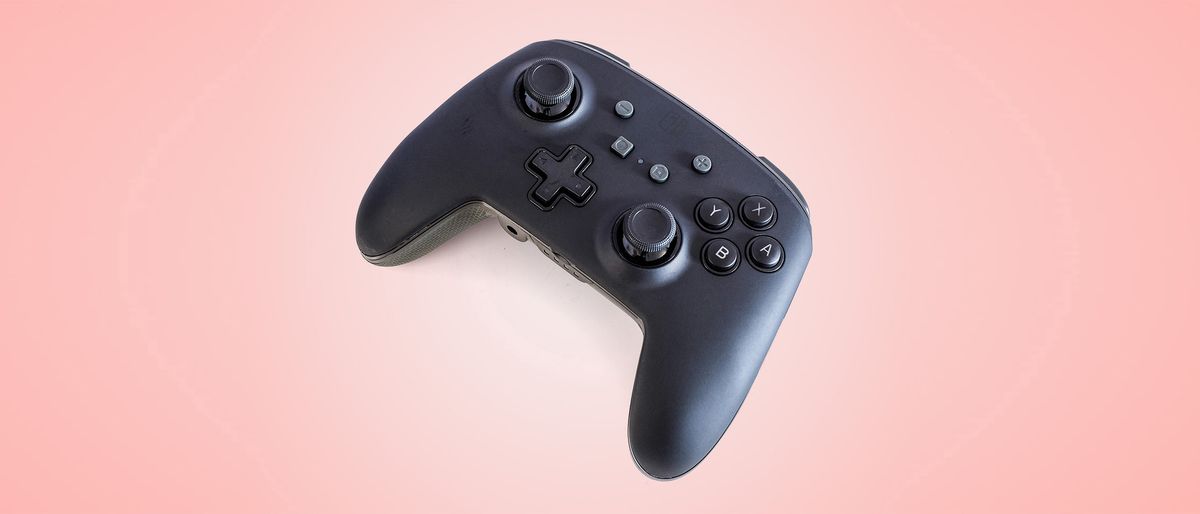TechRadar Verdict
Great button quality and build make this one of the best Switch controllers, but you'll wish it had rumble and you may miss NFC.
Pros
- +
Great build and button quality
- +
Well-designed modular paddle controls
- +
Generous accessory bundle
Cons
- -
No rumble
- -
No NFC
- -
More expensive than a Switch Pro pad
Why you can trust TechRadar
Two-minute review
The PowerA Fusion Pro is a high-end gamepad for Nintendo Switch, and one of the best alternatives to a Nintendo Switch Pro Controller.
It costs $30 more, feels as well-made as a first-party pad and has a programmable paddle module that can be removed if you want the PowerA Fusion Pro to feel more like a normal controller most of the time.
There are two problems, or at least two important missing features. The PowerA Fusion Pro does not have NFC, used to identify Amiibos. And, the part we miss most, there is no rumble feedback at all.
This is doubly disappointing given the older and similarly priced Xbox version of this pad does have rumble motors. It is doubtless an issue of costs, but means you miss out in an important experiential sense by not simply taking the predictable route and buying a Nintendo Switch Pro Controller instead.
However, the PowerA Fusion Pro’s build can compete with far more expensive third-party pads, and what you get in the box is far more generous than the Nintendo pad.
We’re torn, and whether you should buy this pad or Nintendo’s own largely comes down to whether you’ll miss rumble or not.
Price and Availability
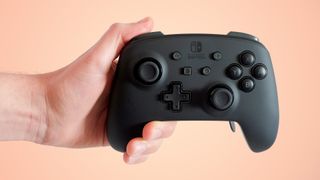
The PowerA Fusion Pro costs $99.99, or £79.99 in the UK. This makes it $30 more expensive than the Nintendo Switch Pro Controller.
It’s a bold move, particularly when the Switch does not have quite the same following of competitive gamers as the Xbox and PlayStation consoles, for which you can buy far pricier “pro” controllers. Why does it cost so much more?
This pad is far better built than most PowerA controllers, and Nintendo has economies of scale on its side. It's easier to make gadgets like this more affordable if you know you can produce and sell them by the truckload.
Design and button quality
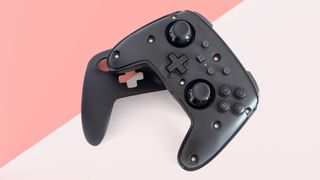
In the language of some accessory companies, “Pro” is synonymous with customization. The most hardcore pads let you remap buttons, alter the sensitivities and dead zones of the analog sticks and triggers.
PowerA offers some of this sort of customization, but build quality is the initial thing that justifies the “Pro" label here. It is excellent, far better than the PowerA Enhanced Wireless Controller we reviewed recently.
Some of this positive impression is created by relatively superficial elements. There are almost certainly weights inside the PowerA Fusion Pro to give it extra heft, because it doesn’t have vibration motors that ‘naturally’ add weight to a pad.
The soft-touch finish of the PowerA Fusion Pro’s faceplates is lovely, and the grips are covered with injection-molded rubber. This pad is tough, grippy and solid. It feels like a first-party pad, and arguably better than the Xbox Series gamepad, whose surface is all hard plastic.
There’s more to the PowerA Fusion Pro’s build, though. Its analog sticks are ALPS parts. The same company provided parts for the PlayStation DualShock 4. This should help minimize stick drift over time. And if they do go awry after a while, you can replace them yourself. The sticks are smooth, and there’s a ring of slick plastic around them to improve the feel of 360-degree rotary motions.
You can replace the faceplates if you wear a shine into the matt finish too. They are kept in place with magnets. You simply lift the plate off with a fingernail, and both white and black ones are included. That has got to be worth $7-10 in the aftermarket accessory world, right?
You get a real sense the PowerA Fusion Pro is made to last, even if some parts will naturally begin to degrade over time.
The magnetic impulse triggers are superb, all the buttons have a well-defined non-hollow action. Playing with a PowerA Fusion Pro is a delight. And it’s arguably even better-looking than Nintendo’s Pro pad, if you like a reserved appearance.
What’s in the box?
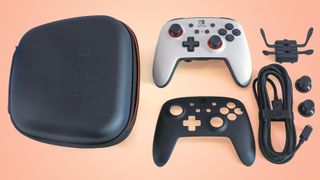
Buy a Nintendo Switch Pro controller and you get the pad itself and a cable in the box. The PowerA Fusion Pro comes with a whole lot more.
There are the two faceplates, mentioned earlier, a good semi-rigid carry case, a long 3m braided cable for charging and wired play, the paddle module and two extra analog stick caps.
These are taller than the standard pair, and one has a convex top. Much like the additional faceplate, you would have to buy these separately with other controllers.
We don’t think this bumper pack of accessories means the PowerA Fusion Pro is suddenly better value than the Nintendo Switch Pro Controller, but everything bundled in is worthwhile.
PowerA’s analog stick caps are covered with a fairly hard rubber, which again should improve their longevity.
Customizable paddle module
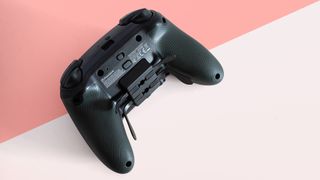
A carry case is nice, but the extra control module is the main reason to buy the PowerA Fusion Pro. This slots into the pad’s back and is home to four metal paddles that can be programmed to take on the job of any button press, including D-pad directions.
The paddles are metal, which feels great, and all four can be removed separately from the module. This is handy, as the pad is much more comfortable to hold ‘normally’ if you just use the bottom two paddles and leave the top two off. They sit closer to the pad’s curves, where the top pair make you moderate your grip a bit too much in our opinion.
Used with the bottom two, the PowerA Fusion Pro’s paddles are good enough to seem not just like a niche feature for the “pros” but just a more comfortable way to play, even casually. We tried them out for a few hours in Zelda: Breath of the Wild, using the paddles to jump and slash the sword. Going back to using the face buttons seemed a downgrade.
You will have to manually set the buttons for each game, though. You long-press a button on the back, press one of the pad’s buttons and then the paddle you want to use to mimic that input. There are no saved profiles, which keeps things simple but may get on your nerves if you switch between games a lot.
We like the PowerA Fusion Pro paddle module a lot. Mostly when only half its controls are actually used, and for the ability to remove the thing completely and put a cover over the back to keep the rear surface smooth.
Other extra features
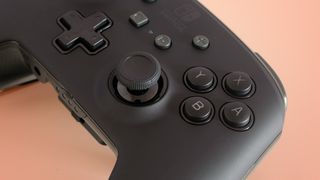
The PowerA Fusion Pro is a wireless controller with a 900mAh li-ion battery that lasts up to 30 hours off a charge.
It also has a 3.5mm headphone socket, unlike the Switch Pro controller. This can only be used when the pad is actually plugged into your Switch, not when connected wirelessly. However, this is down to the Switch’s Bluetooth limitations, not PowerA’s own fault.
The included cable is 3m long — enough to make using headphones while your Switch is connected to a TV feasible.
Missing features
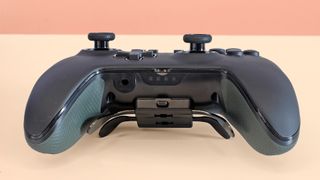
The PowerA Fusion Pro is one of the best sub-$100 Switch gamepads around, but its missing features should put many of you off entirely.
Rumble feedback is the part we miss most. There are no rumble motors here at all, let alone the “HD” rumble kind offered in the Nintendo Switch Pro controller.
This might make sense if the PowerA Fusion Pro were the kind of pad made for those keen on tweaking their controllers a lot, fiddling with analog stick sensitivity, dead zones and the trigger response — for people playing for competition, not a new experience. You don’t get any of that deep customization here, and there wouldn’t be any trigger tweaks to make anyway as the Switch’s shoulder controls are digital, not analog.
Less important, but still crucial to some, the PowerA Fusion Pro does not have NFC. This is used to scan Amiibos.
Thankfully the PowerA Fusion Pro does have motion controls, and these work very well based on out testing. They are smooth and jitter-free. But given the great quality of the inputs and the relatively high cost of this pad, we just wish it had rumble. This would let us give it a more-or-less unqualified recommendation as a Switch Pro alternative for those who want something a bit more interesting.
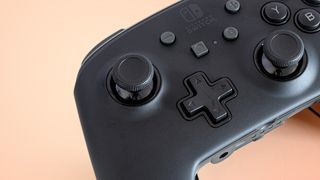
Buy it if...
You want one of the best third-party Switch pads
The PowerA Fusion Pro has zero of the ‘janky’ quality you may associate with third party pads. Its triggers feel fantastic, the buttons are great and the sticks use ALPS parts, like some first-party controllers. Add textured rubber grips and careful weighting and you have a pad that can compete with anything out there in terms of feel and quality of finish.
You want a pad you can plug headphones into
There’s a headphone socket on this gamepad, handy if you play while connected to your TV. This only works if you attach the pad with a cable, but a 3m one in included, letting you get a good way away from the console.
Don’t buy it if...
You like rumble
Buy this pad and you don't just miss out on the Nintendo controller's HD rumble, but all rumble. There are no rumble motors in this pad, which will rule it out for many.
You’re an Amiibo fan
The PowerA Fusion Pro also lacks NFC, which means it can't be used to 'scan' Amiibos. These are compatible with a bunch of Switch games including some you might not guess, such as Skyrim.
The budget is tight
This pad is twice the price of the PowerA Enhanced controller we reviewed recently. It's twice as good in some respects too. However, it's also more expensive than the Nintendo Switch Pro controller. This wouldn't be a big problem if it lacked the above features, rumble and NFC. But it does.
- Best Nintendo Switch accessories: make the most of your hybrid console
Andrew is a freelance journalist and has been writing and editing for some of the UK's top tech and lifestyle publications including TrustedReviews, Stuff, T3, TechRadar, Lifehacker and others.
Most Popular



